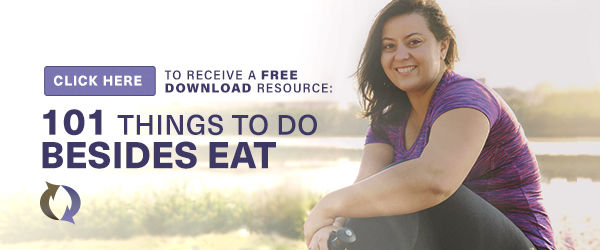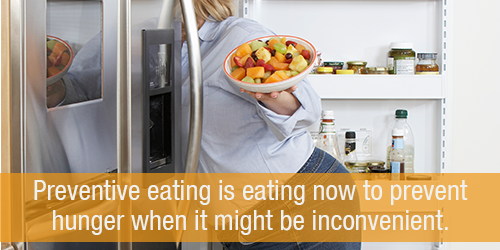Preventive eating is eating now to prevent hunger in the future when eating might be inconvenient.
Or you can think of it like this: Preventive eating is choosing to be uncomfortable for a couple of hours out of fear of being uncomfortable in a couple of hours!
Here’s an analogy we often share in our Am I Hungry? Mindful Eating Programs to help people understand this:
If you’re comfortable in a room but you put on a coat now because you might get cold in an hour, you’ll probably feel hot and uncomfortable in the meantime. Instead, if you wait until you feel cold, the coat will do what it’s supposed to do—make you warm and keep you comfortable.
Hunger works the same way. If you eat now because you might get hungry in an hour, you’ll feel full and uncomfortable. If you wait until you’re hungry to eat, you’ll feel satisfied and comfortable.
What causes preventive eating?
There are many reasons people eat preventively, ranging from lack of awareness, convenience, past dieting, or fear of hunger.
Lack of awareness of hunger: Sometimes people aren’t eating to prevent hunger; they’re eating because they aren’t using hunger to guide their eating. In other words, they eat before they’re hungry in response to cravings and environmental or emotional triggers. Often my clients will say, “But I’m never hungry” because they are eating for other reasons.
Convenience: Let’s face it; when you’re busy, it’s sometimes easier to eat whenever you can, rather than waiting until you’re hungry!
Fear of hunger: Preventive eating may be a response to a fear of hunger. One cause of a fear of hunger is food insecurity—lack of consistent access to nourishing food. Memories of food insecurity as a child or inconsistent availability of food (due to finances or being unprepared) as an adult can cause you to eat preventively out of fear. (Watch this video to learn more about How to Overcome a Fear of Hunger.)
Past dieting: Diets (or restrictive eating for health or other reasons) often use rules to control your eating by telling you when to eat. When your personal hunger rhythms don’t match the diet you’re following, you may have to resist hunger to comply. As a result, you may perceive your natural feelings of hunger as unpleasant, so when you’re off the diet, you may eat preventively to avoid those symptoms.
Eating on a schedule: Popular messages encourage eating on a schedule to “prevent hunger so you won’t overeat.” This is ironic since hunger is your natural signal for eating! Of course, being overly hungry is a potential trigger for overeating, but the solution is to eat when you become hungry—not beforehand!
Metabolism myths: Many “experts” promote eating every few hours. Their explanation is that eating preventively “boosts your metabolism.” While frequently ignoring hunger can put your body into conservation mode, eating before you’re hungry doesn’t boost your metabolism!
Lack of trust: For all these reasons, you may have lost trust in your ability to use hunger to guide your eating, and eat preventively instead.
What to do to prevent preventive eating
Here are strategies for preventing preventive eating.
Let go of restrictive rules
Mindful eating is inside-out! Rules about eating on a schedule and preventing hunger are outside-in.
Let go of the belief that an expert knows better than you when you should eat. As you practice recognizing and trusting hunger to guide your eating, you’ll find the freedom and flexibility are far more convenient and satisfying!
Learn to trust your body wisdom
Whatever your reasons for eating preventively, remember that hunger is your natural guide for meeting your fuel needs. Read How to Tell if You Are Hungry: Symptoms of Hunger.
It’s helpful to remember that feeling hungry for a little while won’t hurt you despite what many diets suggest. In fact, experiencing hunger will help you become more aware of your hunger cues and learn that you can trust your internal fuel gauge. As my grandmother used to say, hunger is the best seasoning!
Since being overly hungry is a potential trigger for overeating, it makes sense to be prepared for hunger by keeping food on hand. (After all, you wouldn’t leave the house with a young child without snacks in case they got hungry!)
Nutritious, delicious foods such as almonds, fruit, string cheese, and other convenient foods can be eaten discretely on a short break, between appointments, or after a meeting, eliminating the need to have a snack hours before hunger tells you to eat. If you are “food suggestible,” then you may find it easiest to have foods that don’t “call to you” even when you’re not hungry.
Overcome the fear of hunger
To combat the fear of hunger, assure yourself that you’ll usually be able to eat when you’re hungry. This may mean reminding yourself that food scarcity is no longer an issue and that you are an adult now who trusts your body’s signals of hunger. It may also mean reminding yourself that eating on a schedule
One of my clients carried a bag of airline peanuts in her pocket to assure herself that she always had food when she needed it. The label was worn off by the time she ate them, but it helped her overcome her fear of being hungry without food available.
Even if you can’t eat the moment hunger strikes, calmly reassure yourself that the symptoms are normal and that you’ll eat as soon as it’s convenient. (Learn more: How to Overcome a Fear of Hunger.)
Of course, you can always eat even if you aren’t hungry. Experiment to see if waiting to eat until you’re hungry makes eating more enjoyable and satisfying—without the side effects.
This article was updated from a previous version.
Enjoyed this article? Here are three more to help you:
How scarcity beliefs drive over-consumption
Should I eat breakfast if I’m not hungry?

